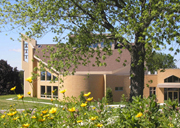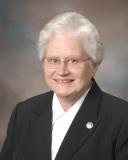by Sister Kathryn Huber, OSB
Reprinted with permission from Alliance for International Monasticism, English Language Bulletin, 2011, No. 100.
It is now forty years since Vatican II concluded, and Pope Paul VI entrusted the ecumenical movement to the monastic orders in a special way, because monasteries form a bridge between Catholicism, Protestantism and Orthodoxy. Monks and nuns are the heirs and direct witnesses of an undivided Church, since they existed before the East-West schism and before the Protestant Reformation.
The ecumenical path of two female Catholic monasteries in the USA has led them to become non-canonical ecumenical monasteries. The first is the Monastery of Holy Wisdom in the suburbs of Madison, Wisconsin, and the second is Dwelling Place Monastery in the mountains of East Kentucky, near the town of Martin, KY. To be an ecumenical community means that the community can admit women of every Christian confession as full members. In each community every woman can be a member, while still belonging to her own confession. Before this, in its capacity as a Roman Catholic monastery, each community could admit only Catholic women, and the community lived by the Canon Law of the Roman Catholic Church.
Holy Wisdom Monastery
 |
For the community at Madison it needed forty years to move from being a Catholic monastery to being an ecumenical monastery. This was a slow and well-researched process, which involved a good number of people, openness, risk-taking and the willingness of other female communities to help and remain in good relationships with the ecumenical community.
Since 1966 an ecumenical vision has guided the community of Madison in all its initiatives. In 1992, after a long period of discernment, a visionary process guided the sisters to conceive the idea of becoming a new ecumenical monastic community, living by the Rule of Benedict. In 1999 the sisters founded the Benedictine Women of Madison, an independent ecumenical community. In the same year they received their first member, an ordained Presbyterian woman, who has now made her solemn vows. In 2006 the process of canonical dissolution of the Catholic monastery was undertaken, and soon afterwards the three sisters made monastic profession for the ecumenical monastery. This presupposed a dispensation from their canonical profession in order to be able to renew their profession for the Monastery of Holy Wisdom.
Dwelling-Place Monastery
 |
A similar move was undertaken by the Dwelling-Place Monastery at Martin, KY, between 2002 and 2008. The experience of Holy Wisdom Monastery served as a guide and model for the Dwelling-Place Monastery. Nevertheless, life in the mountains of Kentucky is not the same as in the suburbs of Madison, Wisconsin!
Dwelling-Place Monastery lies in the part of the USA called the ‘Bible belt’, where Catholics are in a minority. A specialist in ecumenism observed that ‘a religious organization can work in this area only if it has an ecumenical vision.’ The sisters of Dwelling-Place Monastery have been involved in ecumenism ever since their foundation in 1982. In addition the sisters look after the mountain folk, and especially the poor, in different ways.
At the beginning of 2005 the monastery began the various legal and canonical procedures already described. In 2007 the sisters of Dwelling-Place Monastery entered on the process of canonical dissolution and were dispensed from their canonical profession. At the beginning of January 2008 the sisters renewed their profession for the ecumenical monastery. Already several women of different Christian traditions have discerned a possible vocation to these ecumenical communities.
At its Chapter of 2005 the Federation of St. Gertrude established a special category to affiliate non-canonical monasteries into the Federation. Such an affiliation helps ecumenical monasteries and allows the Federation to keep an open door on ecumenism.
Conclusion
Although the legal status of the monasteries had changed, the community life and prayer of the sisters has not, since they continue to live for God and to seek God together according to the Rule of St. Benedict. What has changed is the way of living a monastic life based on the Rule of St. Benedict, a manner of life open to women of different Christian confession s and ecclesial communions. Just like the monasteries on the early years of Christianity, the Monasteries of Holy Wisdom and of the Dwelling-Place are living witnesses to the prayer of Jesus ‘that they should be one.’

Sister Kathryn Huber, OSB is a member of Sisters of St. Benedict, Ferdinand, IN, president of the Board of AIM-USA Secretariat and former president of the Federation of St. Gertrude and long-time friend of Benedictine Women of Madison. (Photo from Sisters of St. Benedict website.)


Comments 2
Hello,
What a wonderful web site! Most refreshing to see and feel the your warmth and focus in a very hustling and bustling world. My wife and I are both retired educators and have just moved to DeForest. I am also a disabled vet and we pass your place when I go to the VA clinic on the West Side of Madison.
My question is, is there any place/need for men ? Would love to help in some way. Visit? Keep up the good work and stay well. G.J. Lewis
Hi Gerald: Thanks for writing. You are always welcome to come out and explore Holy Wisdom Monastery sometime! There are opportunities for men to be involved out here. We have many men who worship with us in our Sunday Assembly worship community on Sundays at 9:00 am, participate in our Oblates ministry, and volunteer on the grounds and in the building. Everyone is also welcome to pray with us during daily prayer at 8:00 am, 11:45 am and 4:30 pm.